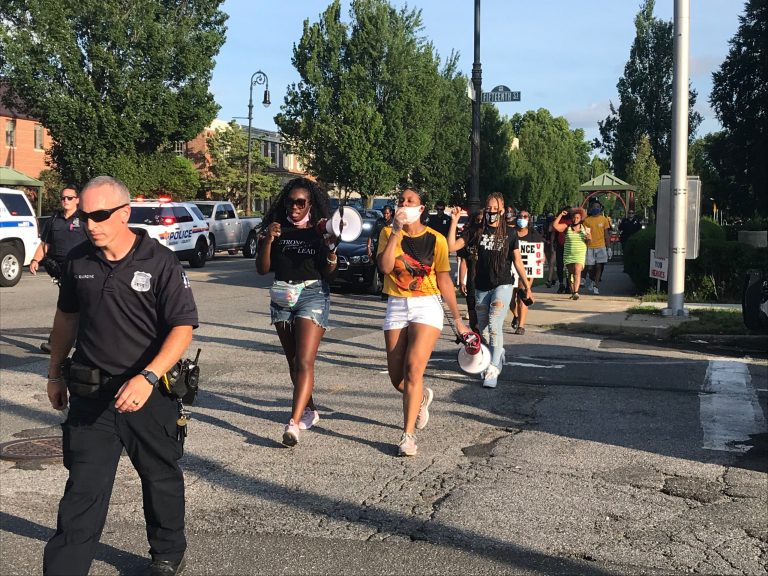
A group of about 30 people walked from Nassau County District Court to the Theodore Roosevelt Executive and Legislative Building on Thursday evening, carrying signs reading “Black Lives Matter” and chanting slogans for social justice as they went.
About as many police officers, if not more, were waiting at the legislative building and on the streets nearby, with lights flashing and cruisers blocking traffic. Police stood around the building while the organizers, two Nassau County teenagers, and others gave speeches to the crowd.
Among the speakers was state Assemblywoman Taylor Darling (D-Hempstead), whom the two organizers call their mentor.
The organizers were Brianna Taylor, 18, of Freeport and Taylor Lewis, 19, of East Meadow. The two stopped the crowd when they reached the steps of the legislative building and spoke about the civil injustice toward Black citizens, specifically Black women, and urged the crowd to vote in elections at the state and county level.
“Justice isn’t about the number of people, it’s about the people who are here,” Taylor said as the crowd stopped.
Taylor coincidentally has a name similar to that of Breonna Taylor, a Black woman from Louisville who was killed in her home by police in March. Her death, among others, has sparked a national uprising of grassroots civil rights demonstrations. Her story is especially important to Brianna Taylor.
“We need to fight for Breonna Taylor like we fought for George Floyd,” Taylor said. “Black women are fighting two battles in this country, we’re fighting racism and we’re fighting sexism. We need support and coalition on all sides and at every end.”
Indeed, the crowd was composed almost entirely of women of color and several of the speakers pointed out that it is often Black women who lead the charge when it comes to social activism.
Darling gave an emotional speech on her experience and said how proud she is of her two activist protégés for their work.
Darling said her sister had pressured her to run for the state Assembly. Darling was reluctant at first because she did not think government was “effective” but in the end she did run and unseated 30-year incumbent Earlene Hooper.
“All of us have things that we can do and when I get discouraged in this role, because I represent that side of the block,” Darling said, referring to her district, the 18th Assembly District, which is less affluent and has a larger population of people of color than Garden City, only a few blocks away.
Darling talked about how the contrast between the two areas is stark and obvious to people from Brooklyn who had come for protests. She said once they crossed the “invisible fence of opportunity” from Garden City into Hempstead they asked “where are the trees and how is this allowed?”
“This is all by design,” Darling said. “What I’m left with is that if it was designed, it can be modified.”
One theme of the speeches was the need to vote and be politically involved and write and call county and state representatives. Darling said she will not have her position forever and the seat cannot be left open, adding that you only need to be 18 years old to run.
“We need to take our pain and anger to the polls,” Taylor said.
The two activists met Darling separately. Taylor met Darling when she did some grassroots campaigning for her during the election. Taylor said the two connected at Darling’s inauguration and Taylor was asked to join a youth action coalition the assemblywoman was trying to build. Lewis met her when Darling came to speak at a workshop of the Jack and Jill group Lewis is part of.
“She was leaving and I actually chased after her and said ‘wait!’” Lewis said. “I asked her if there was anything I could do for her or be a part of her team in any way.”
Lewis said one policy change she would like to see is a reallocation of funds away from police and into communities that are in need of it and different types of training for police forces to deter violence.
Both said they’d like to see changes within the education system as well.
“We never question why we learn about the Holocaust or World War Two and the horrible destruction that happened during that time but there’s constantly a question of morality when we’re talking about Black people and the history of Black lives in this country,” Taylor said.
Taylor called for a more “holistic” education system when it comes to talking about social issues surrounding the Black experience in America. All who spoke pointed out disparities between white communities and communities of color in Nassau County and cited a need to change the system responsible for that.
“Capitalism can’t exist without racism,” Taylor said during the rally.






